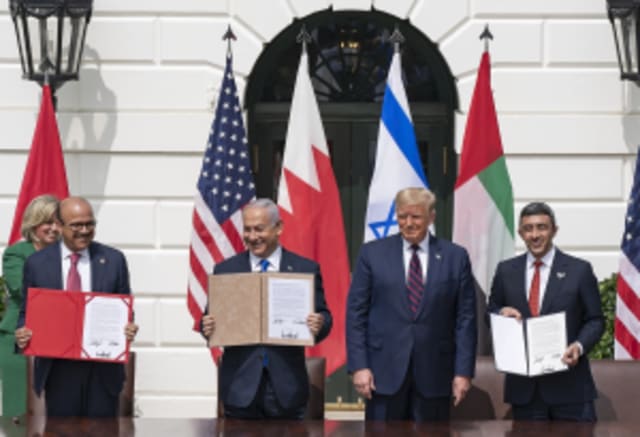Afraid of Trump? Iraqi militias consider disarming or dissolving to avert US strikes – report
Iraqi militias are among last remaining bastions of Iranian power in the region

Several of the mostly Shia Muslim militias in Iraq, which are affiliated with and supported by the Iranian regime and its Revolutionary Guards (IRGC), are considering laying down their weapons or disbanding to avert a looming threat of U.S. airstrikes, according to a report by Reuters.
The U.S. has massively reinforced its troops in the Middle East in recent weeks, and escalated its strikes against the Houthi terror group in Yemen, against the background of a possible military action to destroy the Iranian nuclear program.
After Israel severely weakened Hamas and Hezbollah, and the subsequent fall of the Assad regime in Syria, the Iraqi Shia militias are one of the last remaining untouched bastions of Iranian power in the region.
While some of the militias have taken part in the war against Israel over the past year and a half, mainly by launching attack drones, they agreed to halt their attacks in December amid Israeli and U.S. threats.
In addition to the military threats, there has been increasing diplomatic pressure on the Iraqi government to disband the Iranian-funded and equipped militias.
Reuters’s report cited 10 senior commanders and Iraqi officials, who said that Baghdad received messages from the U.S. explicitly threatening airstrikes unless the Iraqi government dealt with the issue.
When the U.S. escalated its strikes in Yemen some three weeks ago, U.S. Secretary of Defense Pete Hegseth reportedly told Iraqi Prime Minister Mohammed Shia al-Sudani to prevent the militias from attacking Israel and U.S. bases in the region in support of the Houthis.
Senior Shia leader Izzat al-Shahbandar told Reuters that discussions between al-Sudani and militia leaders were “very advanced” and that they were “inclined” to accept disarmament.
“The factions are not acting stubbornly or insisting on continuing in their current form,” Shahbandar said.
A commander from Kataeb Hezbollah, among the most powerful militias in Iraq, said, “Trump is ready to take the war with us to worse levels, we know that, and we want to avoid such a bad scenario.”
Most Iran-backed militias have united under the loose umbrella of the Islamic Resistance in Iraq, while also being part of the Iraqi state military under the banner of the paramilitary “Popular Mobilization Forces” (PMF).
There are around ten main Shia militias, which command some 50,000 fighters and have long-range drones and missiles, as well as anti-aircraft weapons, most of them from Iran.
Al-Sudani supports the U.S. initiative and particularly aims to disarm those groups whose allegiance is more towards Tehran than to Baghdad, two Iraqi security officials said.
The premier’s foreign affairs adviser Farhad Alaadin told Reuters that al-Sudani is committed to bringing all armed forces under state control through “constructive dialogue with various national actors.”
The U.S. State Department also said it is pushing the Iraqi state to extend control over the militias: “These forces must respond to Iraq’s commander-in-chief and not to Iran.”
However, despite the rhetoric about disarmament being the clearest to date, a U.S. official dampened the hopes and cautioned that in the past, the militias had declared they would disarm, only to return later.
Shahbandar said there was no agreement about a disarmament mechanism for now, but noted that options being considered include turning the militias into political parties, which could translate Iran’s military influence into political clout, or full integration into the state army.
Another factor in the discussions is the continuing pressure on the Iraqi government to bring about the release of Russian-Israeli academic Elizabeth Tsurkov, who was kidnapped by one of the militias almost two years ago.

The All Israel News Staff is a team of journalists in Israel.
You might also like to read this:
















